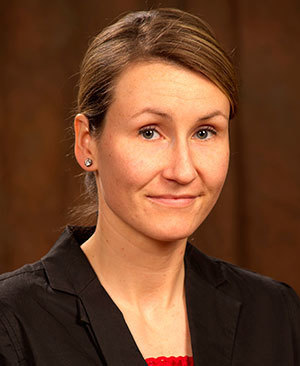 Judith Biesen
Judith Biesen
For married couples, the odds aren’t good when one partner has anxiety or depression. The presence of such a mental issue significantly increases the risk that the couple will get divorced.
Notre Dame psychology Ph.D. student Judith Biesen wants to find a way to improve the outcomes for those couples.
With an American Dream grant from the University’s Institute for Scholarship in the Liberal Arts, Biesen is completing a longitudinal study of mental health—specifically, anxiety disorders and depression—and how it relates to marital functioning and satisfaction with the relationship.
“It has been established through research that, generally, the more depressed or anxious people are, the unhappier they are in their relationships,” Biesen said. “The problem is that most studies only ask spouses about their anxiety, depression, and marital happiness once and, therefore, can’t draw any conclusions about how these factors may change over longer periods.
“I want to go one step further. I’m interested in how anxiety, depression, and marital happiness fluctuate day by day over time—and the extent to which partner support buffers that association.”
Biesen’s study includes more than 50 couples. After an initial assessment visit at a lab, the couples complete daily questionnaires at home for three weeks to report on their moods, their happiness with their relationship, and the support they have received from their partners—both emotionally and through tangible acts, such as helping with household tasks.
“This study is about understanding the mechanisms by which mental health and relationship happiness go together each day, more at a micro level,” she said. “Hopefully, down the road, I can use this knowledge to come up with ways to help couples who face the challenge of mental health issues.”
Biesen first became interested in researching couples as an undergraduate psychology major at the University of Connecticut.
“I was a research assistant at a parent-child lab, and I noticed that when parents came in with their children, I was more interested in how the parents interacted with each other,” she said. “That was when I realized I wanted to focus on adult relationships.”
She later received a master’s degree in psychology from the University of the Pacific, where she focused on communication patterns in couples. Biesen then worked as a research associate in a lab at the University of Miami before joining the Ph.D. program at Notre Dame.
She chose Notre Dame, she said, because of the quality of the faculty, the research focus within the clinical program, and the support graduate students receive.
“I was able to go to Australia last year to present my research on a similar project, with a travel grant from the Notre Dame Graduate School ,” she said. “And I could not be doing this study without the funding I’ve received. I am able to do these things because of the opportunities here—the support far surpasses anything I’ve had or known of at other schools.”


